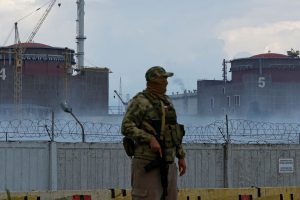Palestine and international legal practice: Interview with Dr. Valentina Azarova (Manchester International Law Centre)

As part of our Winter School, we conducted interviews with the speakers at the program. Below you can find the interview with Dr. Valentina Azarova on Palestine and international law. We hope you will enjoy reading it.
1- “The ICC’s potential role in the Palestinian situation can also indirectly further the enforcement of the responsibilities, not only of Israel, but also of third States and international actors by requiring them to review the ‘good standing’ enjoyed by Israeli officials in their organizations and jurisdictions (such in the context of potential travel restrictions).” If we take into consideration the non-member states of ICC, like China, Russia and Israel, what can you say about the ICC’s role and effectiveness in international law in terms of ensuring the review of ‘good standing’ enjoyed not only by Israeli officials but also any perpetrator of international crimes?
In the article you reference I was looking to make the point that the involvement of the ICC in the Israeli Palestinian context can have a social deterrence role. In January 2015, following Palestine’s submission of an article 12(3) declaration of self-referral to the Court(which was immediately followed by its accession to the Rome Statute that took effect in April of that year), the OTP announced the opening of a preliminary examination in the ‘situation of Palestine’. This does not of course guarantee the opening of investigations, which can, as has been the case of other situations, take up to a decade. In those circumstances, the kind of involvement and influence that the ICC’s actions can have is not that of a law enforcement body in the proper sense, that is prosecutorial and operational, but rather that of a social mechanism symbolic and perceptional, or reputational. With hindsight, it is now clear that this has to some extent been the case of the effects that this preliminary examination has had on Israel and on a range of actors, from individuals to companies and states, with regards to their engagements and dealings with the Israeli authorities. Of course, saying that the ICC is ill-equipped to do more than this, at least in some political charged cases such as Palestine, is perhaps benign, certainly from the perspective of those who have followed and challenged its institutional record, and the structural problems it has perpetuated through its practice of international criminal law. It would seem that it is this reality, in which States fear the reach of the ICC and have taken to constrain its operations through political and financial blackmail, that has also led the OTP to do more by way of activities auxiliary to the investigation and prosecution of international crimes, such as the outreach it plans to conduct in the West Bank and Gaza. It is, at least for now, only in the context of the exchanges it will have through such outreach that it can interact with some of the victims of this situation that otherwise hope to benefit from the Court’s real and full-fledged global law enforcement role.
2- In a policy briefing titled ”Israel’s unlawfully prolonged occupation” you stated that: “Europe should align its positions and actions with the full gamut of international law-based consequences and promote their rigorous enforcement in furtherance of the end of occupation, both bilaterally and in multilateral fora.” Then you added as well that the UN Security Council may act in accordance with its authority under the UN Charter to determine such acts are “crimes against peace and security.” We know that it is very hard to get Security Council Resolution to put an end to an occupier’s violations, but can we say that states can end such violations through collective and unilateral measures?
This is an oft neglected area of international law, so I am glad you have asked me this question. The role and responsibility of third states and other international actors such as the EU as well as companies in relation to the regulation and enforcement of international law on its serial or systemic violators is significant. In the inherently decentralized international legal system in which bodies such as the Security Council play a political role in global governance, both structurally and in practice, there is a need to turn to third party states and other actors such as businesses for enforcement. In the policy brief you reference, I looked at Israel as a highly legalistic actor that has not only internalized certain interpretations of international legal rules that others reject, but regularly promotes these through its institutional and judicial practice as well as in international fora with a revisionist outlook. The practice of international human rights organisations attests to this renewed focus on ‘secondary targets’ and the significance of complicity structures that maintain violations in their perpetuation and impunity.States and actors such as the EU have assumed these obligations as yet in a limited form, by for instance reviewing some dealings they maintain with Israel to ensure that they are not benefiting Israeli settlements in occupied Palestine. What neither leading international human rights groups, nor states have however deployed are legal claims based on the law on the use of force which governs the resort to war and is also known as the jus ad bellum. This is the law from which both the prohibition of aggression and annexation are sourced. The problem I and other see is that there are few occasions and cases in which states and rights groups have sought to promote the pacifist sensibility of international law by claiming that Israel is illegally present in Palestine and has an obligation to withdraw from the territory.
3- You have said: “This normative perspective establishes a legitimate basis for the consideration that Israel is not applying international law in good faith nor capable of doing so, given the mandates of its domestic legal order.” Can you tell us a bit more about the pathology of a legal system and how it is related to the application of international law by Israel?
I have spent a considerable amount of time wrestling with the idea that there is a particularity in the manner in which different violations come about, in terms of their construction by the violating actor’s internal order, and their root causes. Some of the most serious violations are systemic to the internal order of a violating actor. From the standpoint of international law this is significant to determine when the gravity and seriousness of violations manifests from the institutional and domestic practice of a state and are predicated on,sanctioned and mandated by the structural elements of its legal system and political order. The case of Israel is emblematic of such processes of structural violence that arise from its explicit positions on the status of occupied Palestine being ‘disputed’ and ‘non-occupied’, rejection of the applicability of the international law of occupation there, and claims to the territory through the exercise of sovereign authority including through the extension of Israeli domestic legal, executive and judicial jurisdiction to the 250 some settlements which effectively control the land and resources of 60% of the territory of the West Bank. What this means is that the Palestinian population is not afforded the special status and protection it enjoys under international law and Israeli bodies such as the military courts in the West Bank cannot claimto have been established in line with occupation law, nor to be operating in the service of the public order of the occupied territory for the benefit of either Israel’s imperative security needs or the local population. The fact is that the jurisdictional reach of the courts to all walks of Palestinian daily life, which usurps the jurisdiction of local courts, and the persecutorial effect of the courts’ distorted law enforcement practice which has been extensively documented are thus serious violations that arise from the pathology of this legal system.
4-As a renowned academic who has spilled much ink on various aspects of the Palestine-Israel conflict, do you expect that any changes will happen in the matter of Israel and Palestine in the future? How do you predict the future of this problem?
From my ink, certainly not. Though I have written a significant amount on the operation of international law in Palestine, it has been at least partly an exploration of the way international law works not only on a particular case, but in the ultimate subaltern case that Palestine represents; where the politics of the law, and of its international life can and have been easily mistaken for international law itself. In a material sense, the changes that the different practices that both Israel and Palestine have had on the record of international law has been greatly significant. There have been countless international reports, UN fact-finding and other missions, international and transnational litigation, and a growing social movement– the Boycott, Divestment and Sanctions movement — that has at times adopting the language of international law while mobilisingits constituency on the basis of a broader political agenda and has raised the profile of actions by third parties (for better and worse by making them more vulnerable and exposed, and thus also needing more sophistication). Without needing so much to predict the future as to consider the trajectory that is already apparent from the present, it is clear that there is promise in the mobilization of third-party enforcement action, including those by local councils, investment institutions, and supermarkets. Such instances are hugely significant for understanding the local influences of international law and their potential to incentivize and perhaps over time, even if in a slowand restrained manner, bring about change on the ground. Respect for international law is certainly critical to creating the conditions that would enable real change in this context. It is the substantive content of this change and the agenda that it pursues, however, that will have to come from elsewhere, and not from within international law.
5- What advice, academic or career-wise, would you give to an international law student who is willing to contribute to the solution of this seemingly never-ending conflict?
This is a particularly difficult question because it asks me to generalize a perspective and approach that I have acquired through personal, or rather experienced circumstances. As a practitioner-scholar my experiential knowledge has informed my understanding of the informal processes and drivers of international legal consequences in the transnational and local arenas. Having spent a considerable part of my professional life working with primarily local and regional human rights organisations, and then teaching and thinking about the law through and in order to refine my and others’ legal practice, I maintain a particularly strong aversion to the over-valorisation of doctrinal and positivist approaches and a process-oriented understanding of the elaboration and development of law as an instrument of power.That said, the main piece of advice I might therefore give future and young international legal scholars and professionals who would like to work on Palestine is based on the now-generally-accepted view amongst international lawyers and political analysts that few contemporary cases, aside from that of Palestine, make international law appear as morally and politically bankrupt. International law like any law is a product of political consensus-building, but as we know it is also fraught with a particularly unnerving kind of present-past of structural biases that harbor and maintain global injustices.
The obvious demand this creates of course is for us to endeavor to address these malaises by exposing them and bringing them to light. Such critical work however, in my personal view, is less helpful, or self-defying if it is not coupled with a drive to re-discover the conditions of possibility of international and transnational law and legal process. For instance,we should be thinking much more about how to frame and address ongoing processes of structural violence and structures of complicity, also in the case of Palestine. Even with one of international law’s most exceptional and exclusionary cases – what you have called the ‘never-ending’ and also complex ‘conflict’ in Israel-Palestine – innovative legal actions and arguments can adduce new understandings of where and howlaw can be brought to operate in disruptive and subversive ways. This is why I would say that key to the success of an international law student and young-professional in this field is an appreciation of law at work and in process. Only this orientation allows us to both analyse and engage this landscape of normative contestation with both a critical and transformative outlook.
NB: We thank to our student Dilshoda Shokirova for conducting this interview with Dr. Azarova.



